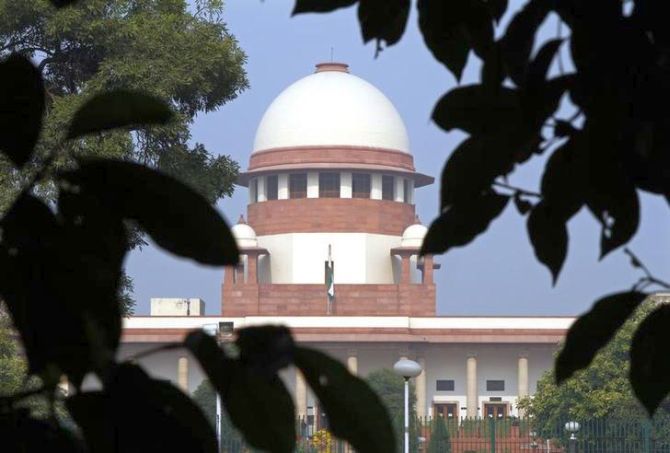The apex court struck down Section 497 of the Indian Penal Code dealing with the offence stating it was archaic and violative of right to equality.

Declaring that adultery is not a crime, the Supreme Court on Thursday struck down a colonial-era anti-adultery law, saying it was unconstitutional, dented the individuality of women and treated them as “chattel of husbands”.
The judgment was welcomed by activists, who said the archaic law should have been dumped a long time ago to keep pace with the rest of world.
The apex court’s five-judge Constitution bench was unanimous in striking down Section 497 of the Indian Penal Code dealing with the offence of adultery, holding it as manifestly arbitrary, archaic and violative of the rights to equality and equal opportunity to women.
A five-judge bench comprising Chief Justice Dipak Misra and Justices R F Nariman, A M Khanwilkar, D Y Chandrachud and Indu Malhotra said that unequal treatment of women invites the wrath of the Constitution.
The top court, which held adultery as a relic of the past, said the autonomy is intrinsic in dignified human existence and Section 497 denudes women from making choices.
The National Commission of Women chief Rekha Sharma welcomed the judgment saying it should have been removed long time ago.
“This is a law from the British era, although British had done away with it long back, we were still stuck with it,” she said. Her views were echoed by many lawyers and activists.
While adultery should not be a criminal offence, the bench held that adultery should continue to be treated as civil wrong, and can be grounds for dissolution of marriage or divorce. There can’t be any social licence which destroys a home, Justice Misra said.
Section 497 of the 158-year-old IPC says: “Whoever has sexual intercourse with a person who is and whom he knows or has reason to believe to be the wife of another man, without the consent or connivance of that man, such sexual intercourse not amounting to the offence of rape, is guilty of the offence of adultery.”
Adultery was punishable by a maximum five years in jail or fine or both.
The apex court pronounced four sets of concurring judgments to declare penal provision on Adultery and section 198 of CrPC dealing with prosecution of offences against marriage as unconstitutional.
Justice Misra noted that adultery dents the individuality of women and it is not a crime in countries like China, Japan and Australia.
“We declare Section 497 IPC and Section 198 of CrPC dealing with prosecution of offences against marriage as unconstitutional,” said Justice Misra, who wrote the judgement for himself and Justice Khanwilkar, adding that any provision treating women with inequality is not constitutional and it’s time to say that “husband is not the master of woman”.
Justice Malhotra, the lone woman judge on the bench, said Section 497 is clear violation of fundamental rights granted in the Constitution and there is no justification for continuation of the provision.
Justice Nariman termed Section 497 as archaic law and concurred with the CJI and Justice Khanwilkar, saying that the penal provision is violative of the rights to equality and equal opportunity to women.
Justice Chandrachud said Section 497 destroys and deprives women of dignity and is destructive of women’s dignity, self-respect as it treats women as “chattel of husbands”.
Adultery might not be cause of unhappy marriage, it could be result of an unhappy marriage, Justice Misra said.
The CJI began reading the judgment by saying the beauty of the Constitution is that it includes “the I, me and you”.
He said equality is the governing parameter of the Constitution and section 497 of the IPC is manifestly arbitrary the way it deals with women.
Justice Chandrachud said autonomy is intrinsic in dignified human existence and Section 497 denudes women from making choices and held adultery as a relic of past.
Legislature has imposed a condition on sexuality of women by making adultery as offence, he said, adding that section 497 is denial of substance of equality.
The CJI and Justice Khanwilkar said mere adultery cannot be a crime, but if any aggrieved spouse commits suicide because of life partner’s adulterous relation, then if evidence is produced, it could be treated as an abetment to suicide.
>> October 10, 2017: Plea filed in SC challenging the constitutional validity of Section 497 of IPC, by an NRI from Kerala, Joseph Shine, who in his petition said Section 497 was “prima facie unconstitutional on the ground that it discriminates against men and violates Article 14, 15 and 21 of the Constitution”.
>> December 8: SC agrees to examine the constitutional validity of penal provision on adultery.
>> January 5, 2018: SC refers to a five-judge Constitution bench the plea challenging the validity of the penal law on adultery.
>> July 11: Centre tells SC that striking down Section 497 will destroy the institution of marriage.
>> August 1: Constitution bench commences hearing.
>> August 2: SC says matrimonial sanctity is an issue but the penal provision on adultery is apparently violative of the right to equality under the Constitution.
>> August 8: Centre favours the retention of penal law on adultery, says it is a public wrong which causes mental and physical injury to the spouse, children and the family.
>> August 8: SC reserves verdict on pleas challenging the constitutional validity of the penal law on adultery in the hearing that went on for six days.
>> September 27: SC holds Section 497 of the Indian Penal Code as unconstitutional and strikes down the penal provision.











 © 2025
© 2025